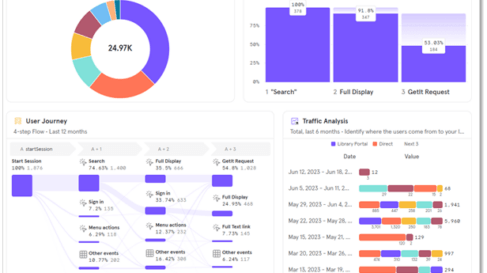Did you know that over 60% of libraries are actively planning to integrate artificial intelligence (AI) into their services? A vital aspect of this change is understanding how AI can enhance library management systems. Advanced applications such as personalized recommendations for users or predictive models for space planning are already delivering impressive outcomes. These tools not only streamline operations but also provide a more tailored and impactful experience for students, faculty and researchers.
A whitepaper from Ex Libris, part of Clarivate, entitled Generative AI and the future of library services, explores the opportunities and challenges of this changing technology environment. The whitepaper shares fresh data and the perspectives of librarians as they navigate the future.
Read on for highlights from the whitepaper.
The rise of generative AI
Generative AI represents a significant leap in artificial intelligence, capable of generating new content or data rather than merely identifying patterns. OpenAI’s ChatGPT, introduced in 2022, marked a watershed moment, bringing Generative AI to the masses with its user-friendly interface and context-aware conversational abilities.
In library environments, AI is already assisting in tasks such as resource discovery, metadata management and personalized learning support. This partnership between humans and AI boosts productivity, enhances decision-making, and drives innovation.
Educational optimism
Despite concerns about plagiarism and shortcuts, optimism about AI’s potential in education continues to grow. Higher education institutions are quickly adapting, integrating AI literacy into curricula to promote responsible usage. AI is being utilized for adaptive learning technologies, personalized educational experiences and automated grading, supporting continuous learning and improving information evaluation skills.
Enhancing discovery and user experiences
AI is transforming search and discovery processes, enabling users to pose natural language queries and receive contextually relevant responses. Tools like Primo Research Assistant enhance the research experience by providing narrated answers enriched with references and direct links to full-text sources, significantly improving user satisfaction and engagement.
At the Universitat Oberta de Catalunya Library, librarians have experimented with Primo Research assistant and other AI tools to assess the impact they make on search and user experience. In just three months, library search adoption increased from 6.75% to 11.63% and user satisfaction increased to 83.7%.
Solving Metadata Challenges
AI advancements in metadata automation are notable, generating rich, structured metadata and identifying relationships between disparate content. Tools like the Alma AI Metadata Generator enrich bibliographic records, improving searchability and reducing manual workload for library staff.
Inclusive AI for an equitable academic future
Yet AI implementations must go beyond functionality; they must be rooted in privacy, inclusivity and transparency. By developing ethical guidelines that prioritize user well-being, libraries can foster long-term trust, ensuring Academic AI is both effective and responsible.
Bohyun Kim, Associate University Librarian at the University of Michigan, said, “The adoption of AI is likely to produce an impact and changes that go far beyond the local improvements that libraries may initially be looking for. In thinking through those impacts and changes and deliberating on how we can collectively ensure AI benefits the broad academic and library ecosystem in the manner that is ethical, responsible, equitable and sustainable. Community forums can play an important role.”
Collaborating for success
As Kim notes, collaboration is key to driving AI success. Crossing institutional boundaries to work with universities, consortia and technology vendors allows for shared learning and a stronger collective impact. Libraries have a long history of collaboration. By working together to improve AI integrations and mitigate the threats posed by AI, more libraries will thrive in a rapidly-changing environment.
Learn more about how libraries are embracing the future
Libraries have an unprecedented opportunity to lead in technology adoption, demonstrating not only adaptability but ingenuity in serving evolving academic needs. Download your personal copy today to stay ahead in this exciting new era for library services.
Learn more about other library management systems such as the digital library platform, controlled digital lending, and central discovery index.
*source: The Clarivate Pulse of the Library 2024 report is now available! – Ex Libris










